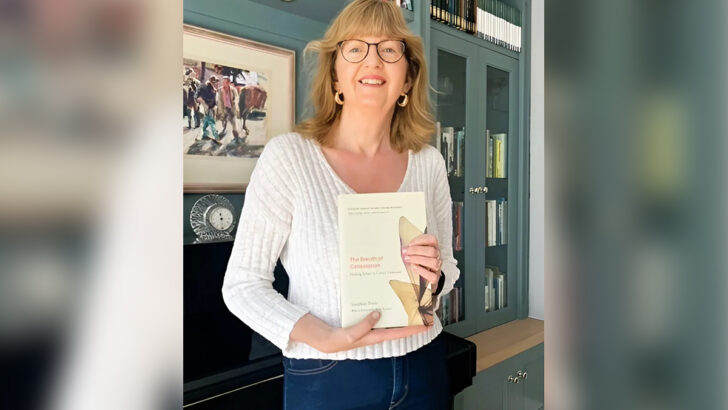On the day Josephine Brady was diagnosed with cancer, the world seemed to shake. For this librarian and lover of literature, the initial shock was overwhelming. Yet, during the uncertainty, she found herself reaching for books. Not just any books, but ones that might help her understand the reality of her situation. The result of this journey is her new book, The Breath of Consolation: Finding Solace in Cancer Literature. In this time of preparation for Christmas, her book takes on a special significance.
Diagnosis
“When I received my diagnosis, like anyone in such a situation, I was in shock,” Josephine recalls. “As a librarian, my first instinct was to search for profound writing about cancer. Something beautifully written that captured the complexity of living with the disease – the suffering, the endurance, the search for meaning. But I struggled to find a book that truly spoke to my experience.”
Months later, during the cycles of treatment and recovery, Josephine had an idea. “I decided to write the book I couldn’t find,” she said. “It took me ten years. Between treatments for cancer and diving into research, I explored cancer literature across three centuries, six continents, and thirteen countries.”
This task became a personal and intellectual odyssey, concluding in The Breath of Consolation. Through it, Josephine aimed to offer a support to readers struggling with illness or loss, especially during moments of vulnerability such as Christmas.
Deep writing allows us to explore the meaning of life, why there is suffering, and how we can find hope”
As a librarian, Josephine is a firm believer in the healing power of books. “Libraries are places for the cure of the soul,” she explains. “That’s how I feel about the importance of literature. With physical diseases, we hand it over to the medics and hope they look after us. We have no control over it. But literature helps with the mental and emotional struggles.”
Hope
For Josephine, profound writing has the ability to help readers face life’s essential questions. “Deep writing allows us to explore the meaning of life, why there is suffering, and how we can find hope. It reminds us that there is significance in our lives, even in suffering.”
One of the writers who influenced Josephine’s work is Christian Wiman, a professor at Yale Divinity School. “He describes reading profound literature as a form of liturgy, a sacred practice,” she says. “I love his writing. He’s deeply spiritual and explores themes of faith, doubt, and the universal need for compassion and empathy.”
Josephine also draws inspiration from Henning Mankell, whose reflections on living authentically caught the author’s attention. “These voices emphasise the significance of life and the natural cycle we are all part of,” she notes.
This connection between reader and writer is deeply personal for Josephine. “You feel an intense bond with the writer. They articulate what you find difficult to express. I’m not a poet, but they capture feelings I have myself, like compassion and empathy.”
I included writers like CS Lewis, who grappled with suffering and questioned God. In the end, he didn’t doubt his faith. His journey reflects the complexity of belief”
Raised in a Catholic household, Josephine’s faith has been a constant, though her relationship with the Church has sometimes been complicated. Writing The Breath of Consolation was an act of faith, a means of engaging with life’s larger questions. “My upbringing made God a presence in my life,” she reflects. “But it’s when you read profound writing about suffering, death, and fear that you discover your inner self and your values.”
Josephine’s book incorporates a diverse range of perspectives to meet the needs of all readers. “I included writers like CS Lewis, who grappled with suffering and questioned God. In the end, he didn’t doubt his faith. His journey reflects the complexity of belief.”
Voices
Josephine’s research brought her into contact with different of voices, each offering wisdom in the face of suffering. Tolstoy’s The Death of Ivan Ilych was a standout. “It speaks to the mental, emotional, and spiritual suffering that accompanies illness. Such works give readers the language to articulate their pain and the courage to confront it.”
Poetry, too, played a critical role in Josephine’s journey. “Mary Bradish O’Connor’s poetry was a lifeline during my treatment. I brought one of her poems to every cycle of chemo. When I couldn’t read anything else, that one poem got me through it. It reminded me that it wasn’t my fault.”
Jane Kenyon, the American poet who passed away from leukaemia, also left a profound impression. “Her poem ‘Let Evening Come’ is beautiful. It’s about acceptance. It transforms suffering into beauty.”
“The writers I turned to during my illness understood this. They remind us that light comes even in the darkest moments,” said Josephine.
Resource
In crafting The Breath of Consolation, Josephine sought to create a resource that readers could turn to during difficult times. “I designed the book to be accessible, with essays and excerpts that people can dip into as needed,” she says. “The writing process was transformative for me. It revealed aspects of myself I hadn’t fully understood.”
Josephine’s faith deepened during this time. “Writing this book was, in many ways, an act of faith. It was a way to contribute meaningfully to the world.”
Her choices show this spiritual journey. Writers like John O’Donohue, whose reflections on Celtic spirituality celebrate the sacredness of life, are included in her book. “I want readers to take away the message that suffering is an inescapable part of life, but through it, we can find meaning, serenity, and a deeper appreciation for life’s preciousness.”
Physical problems and death may be looming, but there’s a sense of acceptance, of appreciating every moment while we’re alive”
“Every human being experiences suffering in some shape or form. Some seem to bear a heavier load than others, but it happens to everyone. And every life ends in death. But there’s also a sense of continuity – the world continues, and our role is to live as best we can, to make a difference, to play our part.” This perspective has reshaped how Josephine approaches her own life. “Physical problems and death may be looming, but there’s a sense of acceptance, of appreciating every moment while we’re alive.”
Anchor
For Josephine, faith remains an anchor. “I still dip into the Bible regularly. It reminds me that God is with me, that there’s a greater purpose. We can’t always see it. It can’t be rationally explained, but it’s there. I believe it’s divine.”
Josephine stresses the importance of engaging with faith and literature consistently. “You forget lessons if you don’t continue to practise. Whether it’s religion or reading, you need to engage, or you risk losing the perspective they provide.”
For her, Advent is an invitation to reconnect with these truths. “Bad things happen, but God is there. Literature reminds us of life’s greater purpose. It keeps us from despair and urges us to keep going.”
In The Breath of Consolation, Josephine Brady has created a work that bridges literature, faith, and the universal human experience of suffering.
Life is fragile, but it is also precious,’ Josephine says. ‘It’s about waiting for the light and embracing the hope it brings’”
By gathering the voices of poets, novelists, and thinkers from across cultures and centuries, Josephine has crafted a book that speaks to the heart. In this season of Advent and Christmas, her message feels timely: through courage, reflection, and connection, we can find meaning and serenity in even the darkest moments.
“Life is fragile, but it is also precious,” Josephine says. “It’s about waiting for the light and embracing the hope it brings. That’s what literature and faith offer: hope during life’s struggles.”


 Renata Milán Morales
Renata Milán Morales Josephine Brady pictured with her book The Breath of Consolation: Finding Solace in Cancer Literature.
Josephine Brady pictured with her book The Breath of Consolation: Finding Solace in Cancer Literature.